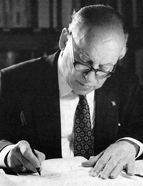

Already holding two doctorates, he returned to Portugal in December 1960 and was admitted as a senior lecturer at the Faculdade de Letras da Universidade de Lisboa [School of Arts and Humanities of the University of Lisbon].
At that time, he was influenced by the Annales School, which, in the wake of Lucien Febvre, insisted on constantly questioning whether history fulfilled its function as the “science of men in time,” specifying that historians should be interested in everything that had been marked by humans in the long adventure of generations. And “how to write history” was a concern that accompanied him throughout his career, on which he wrote several texts. The first was presented in 1963 at the Portuguese Academy of History, of which he had been a corresponding member since 1960. He gave it the title “On the possibility of a new ‘History of Portugal’, method and sources”, in which he discussed how to write a new history, raising a series of questions about the selection of sources and the epistemology to be followed in their use. He reviewed all the histories of Portugal published up to that point, distinguishing “those based on documentary evidence, those with a philosophical intent, those of a purely literary nature, those with a scientific perspective, those intended for dissemination and those with an apologetic basis”, proposing his own conception of history: [that it should be] “a work that is rigorous in its documentation, with bibliographical notes that substantiate its content, objective in meaning, scientifically supported, in a construction that corresponds to the intellectual demands of our time”. He reinforced this position: “It is in this fidelity to scientific history, backed by sources, rigorous in interpretation, embracing various branches of knowledge that serve to document and clarify the past, that my spirit was formed and, fortunately, still remains”. He further developed and deepened these assumptions in the aforementioned História e Conhecimento Histórico (1968) and in a paper presented at the Lisbon Academy of Sciences in 1977, when he was made a full member of this institution, with the title “Reflexão para uma ‘História de Portugal’ (Reflections on a ‘History of Portugal’), which he included in the introduction to the first volume of his História de Portugal, published in the same year. He never abandoned his penchant for understanding man in his historicity and interpreting the historical process, from the philosophers and historians he mentioned in his degree dissertation to those he read, among whom Max Weber, Georg Simmel, Benedetto Croce, Ortega y Gasset, Charles-Victor Langlois, Gabriel Monod, Charles Samaran, Henri-Irénée Marrou, Arnold J. Toynbee and Raymond Aron. He followed everything that was published in Portugal and abroad, especially in France, on the theory of history, which he considered an indispensable discipline for the formation of knowledge (Ler História, p. 139).
This work is financed by national funds through FCT - Foundation for Science and Technology, I.P, in the scope of the projects UIDB/04311/2020 and UIDP/04311/2020.
